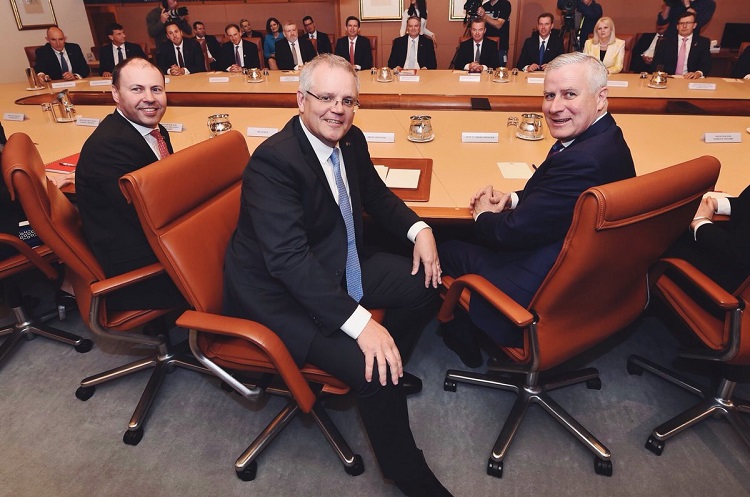IN THE MEDIA
Why Scott Morrison is right to consider moving the Australian embassy to Jerusalem
October 18, 2018 | Colin Rubenstein

The Strategist – ASPI
18 October 2018
The prime minister’s announcement that Australia will consider moving its embassy to Jerusalem, and also review our stance on the Iran nuclear deal is prudent, wise and in our national interest.
It makes sense to move the Australian embassy to Jerusalem, first and foremost because it recognises the reality that Israel established Jerusalem as its capital in 1950, with West Jerusalem the location of its parliament, its supreme court and government agencies. Like every other country, Israel has the absolute right to choose its own capital on its own territory.
Moreover, there’s no real reason to believe recognising Jerusalem, especially West Jerusalem, as Israel’s capital would damage prospects for a negotiated two-state solution between Israelis and Palestinians, with East Jerusalem as the capital of a Palestinian state.
West Jerusalem has been sovereign Israeli territory since 1948. It’s only East Jerusalem, captured by Israel in the 1967 Six Day War, that remains in contention for potential allocation to the Palestinians in a two-state outcome.
The traditional reluctance of nations to recognise Jerusalem as Israel’s capital is not about the 1967 war or East Jerusalem. It rather stems from an obsolete element of the UN partition resolution of 1947, which called for the mandated territory of Palestine to be divided into Jewish and Arab states, with Jerusalem and Bethlehem as an ‘international city’ under UN control. This idea never eventuated and is advocated by no one today.
Yet misplaced fears and inertia have kept this obsolete policy of not recognising Israeli control of West Jerusalem in place for seven decades amid claims any change would damage the peace process and generate a violent reaction from Arab or Muslim nations.
Today, no one doubts that any negotiated two-state peace agreement would see Jerusalem remain as Israel’s capital—even though there effectively is no peace process at the moment.
In fact, there’s a strong case to be made that an embassy move may help unlock the stalled peace process. With the Palestinian side openly refusing to negotiate in recent years, the US embassy move was part of a strategy by the Trump administration to break through the impasse by signalling to the Palestinian leadership that such intransigence has a price and time is not on their side. Australia’s bipartisan policy of supporting a negotiated two-state peace would be best served by doing what we can to assist these efforts.
Fears of retaliation by Arab or Muslim nations in response to a move of the Australian embassy would be a poor basis for decision-making by Canberra and have been vastly over-hyped by those opposing the government’s review.
The US made its decision last December, and it has not perceptibly impacted its relations with its Arab and Muslim allies, including trade ties. The US has actually officially recognised Jerusalem as Israel’s capital since President Bill Clinton signed the Jerusalem Embassy Act in 1995—without any negative consequences. Every US president since has at some point promised to follow up this legislation with an actual embassy relocation—the only thing new is that Trump has actually fulfilled this pledge.
There were also no significant consequences to the recognition of Jerusalem as Israel’s capital by Russia, the Czech Republic, Vanuatu or Guatemala. In fact, the Sunni Arab states are likely to be more pleased that Australia is reconsidering its support for the nuclear deal with Iran than getting upset about Jerusalem. They are today far more concerned about the threat posed to the Middle East by Iran—which leads them to see Jerusalem as a potential ally—than Israel’s conflict with the Palestinians.
Media reports that Indonesia is considering suspending an imminent free trade agreement in response to Australia’s proposal are simply a beat-up. Apart from one quote from an unnamed official of unknown seniority, there have been no public or official statements from Indonesia supporting this claim.
Scott Morrison has also said that he’s ordered an inquiry into whether Australia should abandon support for the Iran nuclear deal, known as the Joint Comprehensive Plan of Action (JCPOA), from which the US has withdrawn.
Three years after it was signed, it is now crystal clear the JCPOA is not working as promised. Flaws in the deal and sunset clauses mean that even if Iran was fully complying with it, the JCPOA could enable Iran to develop nuclear weapons when the deal runs out between 2025 and 2030 and continue to develop ballistic missiles to carry those weapons and research improvements to its centrifuges to vastly speed up uranium enrichment in the meantime.
Meanwhile, an archive of smuggled Iranian intelligence documents revealed by Israel have shown that since the signing of the nuclear deal, Iran has continued to pursue a strategy of non-compliance and incomplete disclosure of its nuclear capabilities and ambitions in violation of the JCPOA’s letter and spirit.
The JCPOA agreement has effectively empowered Iran to step up its other menacing activities including financial and military support for the brutal Assad regime in Syria, Houthi rebels in Yemen, and terror groups Hamas in Gaza and Hezbollah in Lebanon.
Australia is a country committed to nuclear non-proliferation, and it’s clear that the JCPOA is not serving that objective. Meanwhile, clinging to the flawed JCPOA will not only alienate and disappoint the US, our most important ally, but also almost all the Sunni Arab states.
For these reasons and many more, the prime minister’s decision to consider moving the embassy to Jerusalem and review the Iran nuclear deal are appropriate, principled and in our national interest. To argue otherwise is to cling to outdated positions while remaining blind to the changes which have taken place internationally over the past few years.
Tags: Australia, Iran, Israel, Middle East





